Chart rankings, industry influence, music consumption in the new media era, K-pop’s globalization — these are some of the factors that are often highlighted in discussions of BTS. However, the group’s success and its implications for music history should be observed, above all else, through the merits of their music itself.
BTS stand out from their countless idol contemporaries for expressing themselves honestly through their music rooted in hip hop. Successfully negotiating the traditionally contradicting elements — hip hop and idol identities — they have d something entirely different from other K-pop boy bands.
Around the time BTS debuted in 2013, hip hop music, which had gradually gained popularity in Korea since the mid-2000s, started to make a palpable impact on K-pop across the board. Notably, the boy band Big Bang adopted a hip hop image and attitude, and idol-turned-hip hop stars like G-Dragon and Jay Park emerged. The popularity of “Show Me the Money,” an audition program launched in 2012 by the music and entertainment channel Mnet, helped to bring the inherently underground genre to the mainstream.
The rise of hip hop has infused new imagination into idol music, which spearheads Korean pop music. An idol band committed to hip hop or a hip hop group in idol outfits was a carefully devised new formula and many new bands were organized along the same lines. However, none of them has embraced the essence of hip hop more effectively and successfully than BTS.
Bang Si-hyuk, CEO of BTS’ label Big Hit Entertainment, wanted to an idol group with a hip hop identity that could do more than just rap. Its leading members, RM and Suga, were selected based specifically on their talents as rappers and producers. Bang encouraged them to exercise creative freedom, so that hip hop could serve as a medium for their own stories rather than being a mere “accessory.” The result was the birth of a hip hop idol group with exceptionally raw, honest and healthy messages.
The Core of Hip Hop
Unlike their idol contemporaries, BTS employed an old-school hip hop sound and style that harks back to the 1980s and 1990s. This is especially apparent in their earlier works dubbed the “School Trilogy,” and then resurfaced in the singles “Intro: Persona” and “Dionysus” from the latest album “Map of the Soul: Persona” released this April, asserting once again that their musical roots are in hip hop.
With an interest in old-school music, BTS have adopted in their lyrics the literary sensibilities and social criticism of ‘80s and ‘90s hip hop. Behind their success in rendering the decades-old style as well as the latest trap beats are the producers of Big Hit Entertainment, including Pdogg and Supreme Boi, who know more about the genre than anyone else in the Korean music scene.
Although some would suspect otherwise, BTS remain committed to hip hop, staying faithful to the genre’s fundamental elements of authenticity and representation. Rappers are expected to tell genuine stories and honestly represent their class and origin, and they are judged accordingly, sometimes quite harshly. In this respect, the music of BTS has stayed true to the essence of hip hop.
Instead of imitating others, BTS have consistently told their own stories, expressing their pain and rage as underdogs in society, far removed from the privileges of those born with a silver spoon in their mouths. They also made a delightfully creative attempt to assert their provincial identity in a song featuring rap in Korean regional dialects. This honesty has appealed to the public and garnered their support. Despite occasional criticism from the hip hop community and idol fans, their authenticity and commitment to the genre has been proven by the way they have constantly expanded their musical boundaries without abandoning their rapper identity. Lead rappers RM, Suga and J-Hope have each produced their own mixtapes aside from the group’s regular albums, demonstrating their talent as rappers and producers. Although the projects were not intended for commercial success (being made available as free digital downloads), the resulting albums served as intimate s of their thoughts as artists.
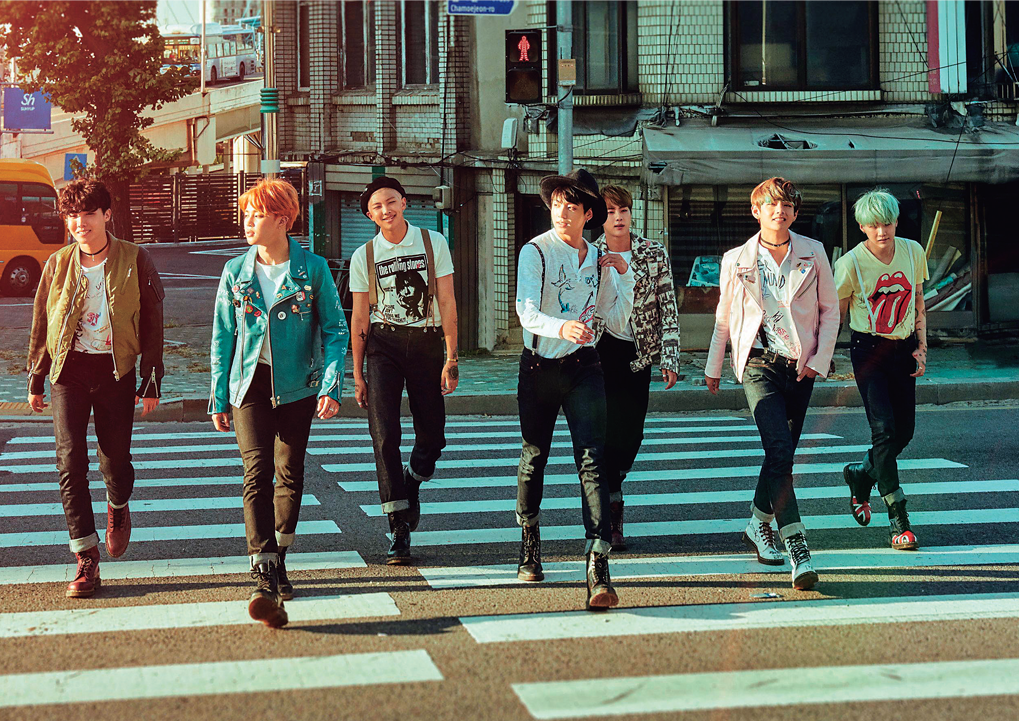
Concept photo for “The Most Beautiful Moment in Life, Pt. 2,” the second album of the Youth Series and the group’s fourth mini album, released in 2015. The photo was released under the title “Je Ne Regrette Rien” (I Don’t Regret Anything), expressing the youthful energy that refuses to be satisfied with reality.
Continuous Narrative
The lyrics are often counted as a crucial factor in the appeal of BTS music, but it would not suffice to simply say their lyrics are good. BTS place narratives at the center of their career, and they are the only K-pop artists to do so. Today’s idol music has used predetermined concepts, worldviews and characters like those of role-playing games as indispensable elements for promotion. But the concepts and worldview assumed by BTS transcend those of existing idol music, which is often limited to fictional and abstract ideas. The ordinary, realistic, true-to-life character constructed by each member is free of artificiality and affectation. Furthermore, BTS have d a continuous narrative in the form of serial concept albums with unified themes.
Their messages are received as genuine and sincere because the lyrics written by the members match their characters as individuals.
Consisting of “2 Cool 4 Skool” (2013), “O!RUL8,2?” (2013) and “Skool Luv Affair” (2014), the School Trilogy speaks from the perspective of students about their dreams, happiness, frustrations and anger. Earlier in the 1990s, Seo Taiji and Boys and H.O.T. had dealt with school life in their songs, but the message communicated by BTS is more concrete and personal.
As the band’s career developed and its members grew older, their stories changed. In the Youth Series with “The Most Beautiful Moment in Life, Pt. 1” (2015), “The Most Beautiful Moment in Life, Pt. 2” (2015) and the second studio album “Wings” (2016), the group expanded their scope beyond school life, and featured some literary themes from the contemporary youth experience — their beauty and suffering, maturity and temptations. Taken from English-language coming-of-age novels or Japanese boys’ cartoons, these themes and visual motifs have been widely used in the lyrics, melodies and music videos, constructing the band’s unique worldview and aesthetics. In the process, they reveal their weakness as individuals with no pretension or adornment, departing from the typical K-pop approach of projecting perfect and flawless idol images.
With time, the members have matured both as musicians and individuals, and their stories evolved into philosophical discourses on the agonies and anxieties of wounded youths, which are expressed in the series “Love Yourself” (2017–2018). The theme of self-love, borrowed from “The Art of Loving” written by the psychologist Erich Fromm, was employed to continue and develop the narrative from the previous albums. Rather than reducing the concept of love to the banality of relationships, they turned it into a healing message for today’s youths: Love yourself.
Going through the enticement of love and the pain of a broken heart, they started to reflect on themselves, and the fundamental question “Who am I?” is proposed in the latest album “Map of the Soul: Persona.” Their messages are received as genuine and sincere because the lyrics written by the members match their characters as individuals. BTS is not a commodity manufactured by producers with artificial images improvised based on trendy concepts; the personality of each member is reflected in the character he assumes in the group, and their growth and change in thinking are frankly expressed in their music. From this ground grows their authentic narrative, one of the greatest merits of their music.
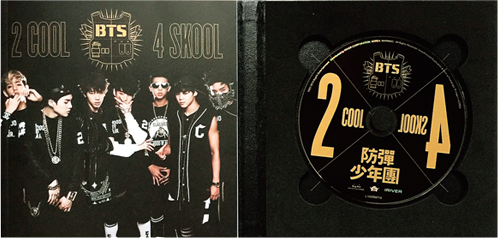
Earlier looks of BTS members can be found on the jacket of “2 COOL 4 SKOOL,” their debut single, released on June 12, 2013.
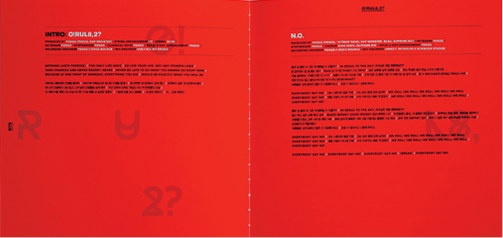
The jacket of the first mini album “O!RUL8,2?,” employing an old-school hip hop sound, has a powerful hip hop concept with its bright red color and bold lettering.
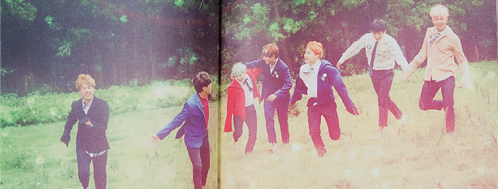
“The Most Beautiful Moment in Life” series, consisting of the third and fourth mini albums, is devoted to life’s brilliant moments of beauty and happiness, reflecting the change in the consciousness of the members in their passage from boys to young men.
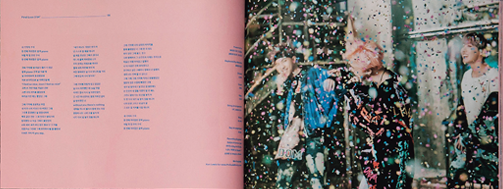
The repackage album “You Never Walk Alone,” issued in 2017, is a bright representation of youthful friendship and inner growth.
Lyricism with Universal Appeal
BTS’ narrative is convincing because their music is in beautiful harmony with their message. There is logic in the way all the songs in the albums are sequenced, and the details of the employed genres and arrangements are closely related with the stories the lyrics aim to deliver. Rather than laying too much emphasis either on the message or the sound, they blend the two seamlessly to their stories.
Their music is both trendy and retro at the same time, keeping a subtle balance between old and new, and between Western and Korean, to acquire unique lyricism with universal appeal. BTS have experimented with diverse genres, such as old-school hip hop, electronic dance music, pop, R&B, and even traditional Korean music and African sounds, but never for the sake of mere variety. Instead, each genre has been an effective means to express their artistic self-awareness and present their own stories.
There is something sad and nostalgic about the melodies of BTS songs, and even the most exciting rhythms are colored with subtle melancholy. This unique trait has touched the sensibilities of not only young people in their teens and twenties, but middle-aged fans who are yearning for their youthful days and audiences all over the world across national and cultural boundaries.
Youngdae KimMusic Critic